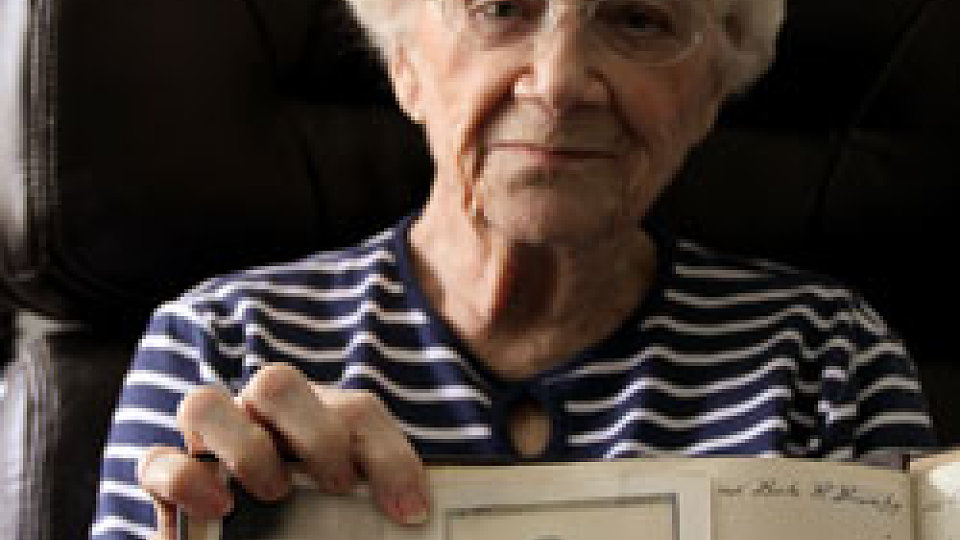A badge of honor
It was his fifth mission as a bomber pilot during the Second World War and pilot Birt Brumby, then 23, was leading the second crew of the 458th Bombardment Group, flying a B24 Liberator over Bielefeld, Germany.
Shards of flak pelted the midsize bomber as he navigated the shaky course on that cool day in early December 1944.
During training camp, the Houston native was known by his crew as “the meanest son of a gun who ever walked,” said Ann Brumby, who often acts as Brumby’s historian.
[caption id="attachment_9534" align="alignright" width="250"] Ann Brumby often serves as her husband Birt's historian.[/caption]
“He wanted everything done right and wouldn’t let the crew, mostly teenage boys, rest until everything was perfect and complete. They hated him for it.”
But once they arrived in Europe and saw all the “dumb mistakes” other pilots and soldiers made, their opinions changed immediately. They instantly understood why he had been so hard on them. What started as resentment quickly became respect for their leader.
A piece of flak came straight toward Brumby’s plane and he turned it at the last second so it wouldn’t hit his copilot. But it struck his hand instead and started bleeding everywhere. As he writhed in pain, Brumby’s copilot took over and landed the bomber.
Once on the ground, he was immediately rushed to the hospital, where he recuperated for a month.
While he was recovering, his crew secretly got the steering wheel – with the piece of flak still lodged in the center – to present Brumby as a badge of honor for his heroic flight.
When the military found out, they almost didn’t let him keep it. When Brumby boarded the boat to go back to the United States, they said he needed to return it because it was government property. But he eventually talked them into letting him keep it. It now hangs on the wall of his Parkway Place apartment in Houston.
At the end of his service, the Air Force awarded him the Purple Heart for his wounding during combat. He ultimately saved his copilot’s life by taking the flak. He was the only one in his crew to receive the award.
He totaled more than 30 missions during his three years of war service, mostly over France and Germany. He was often the lead pilot, the most dangerous position. Brumby never lost a man and he never lost a plane, which was rare. According to a 2007 report in “The Times” (London), there was a 44.4% casualty rate among bomber squads; an additional 6.7% were wounded and 7.9% captured as prisoners of war.
“He was hell-on-wheels; he wanted everything done right,” Ann Brumby said. “When they arrived in Europe, they saw many people make dumb mistakes. They didn’t make the mistakes anymore because they had been trained not to. The crew told me they felt like Birt was the one who got them all home safely because they had been trained so well.”
Now, at age 97, this American war hero is a living example of unmeasured bravery and sacrifice for his country. He’s only one of three men who are still alive from his crew. Ann Brumby said it wasn’t until the past 10 years or so that Brumby opened up about his service.
“Men in World War II did not come home talking about (the war),” she said. “It was not to be talked about. They said it was not good conversation. But because of that, a lot of their stories are gone.”
Jimmy Johnson, executive director of Parkway Place, agreed.
“Parkway Place veterans are very special to all the staff and residents. As you listen to the stories of these men and women, you realize how young they were when they went to war and the sacrifice they made for their country and families. When you realize what they gave up to help keep the foundation of our freedom as we know it today alive, we can’t thank them enough. I can only say it is truly an honor for Parkway to have them as residents in our community.”
[icon icon=icon-envelope size=30px color=00337f float=left]
Chelsea White is the communications specialist for Buckner Retirement Services. Contact her at cwhite[at]buckner[dot]org.



